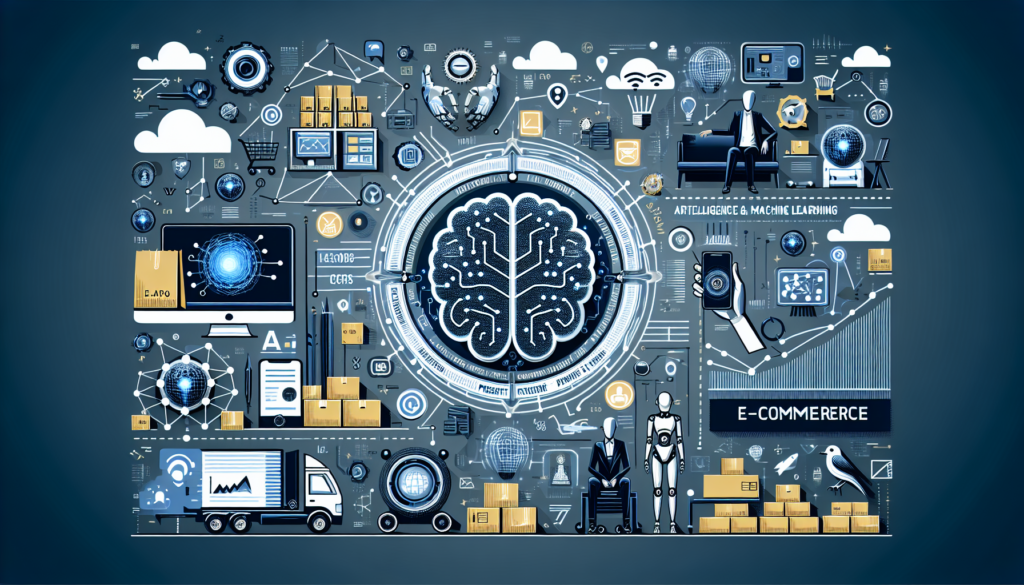In the vibrant and constantly evolving interface of e-commerce, artificial intelligence (AI) and machine learning (ML) emerge as the drivers of a profound reconfiguration of strategies and operations. Cutting-edge technologies in AI and ML are not only redefining the user experience and internal processes of companies but are also paving the way towards a new era of mass customization, operational efficiency, and the discovery of commercial insights. This article dives into the most advanced technical mechanisms and practical applications of AI and ML in e-commerce, demonstrating how these technologies form the central axis of a commercial and technological revolution.
Artificial Intelligence in E-commerce
Current practical applications: AI has been embedded at the core of e-commerce through chatbots powered by natural language processing (NLP), intelligent recommendation systems, computer vision tools for product recognition, and the automation of personalized marketing. Chatbots offer 24-hour customer service, while recommendation systems employ complex algorithms to predict consumer needs based on purchasing and browsing patterns.
Advanced recommendation systems: These systems are no longer limited to simple collaborative filtering. They now incorporate deep neural networks (deep learning) that are trained on vast datasets to discover subtle patterns in consumer behavior, resulting in highly personalized recommendations and market trend predictions with unprecedented accuracy.
Computer vision in product identification: Computer vision algorithms, such as Convolutional Neural Networks (CNNs), are revolutionizing the way e-commerce platforms handle and categorize products. These algorithms can automatically identify and label items in images, improving product indexing and the visual search experience for users.
Marketing automation and personalization: AI has enabled real-time audience segmentation and content personalization, offers, and advertising, all driven by predictive analysis. Data-driven decision-making has enabled companies to design campaigns that dynamically adapt to individual user responses and behaviors.
Machine Learning in E-commerce
Dynamic pricing optimization: ML systems analyze countless variables in real-time, from supply and demand to competitor behavior, to proactively adjust product prices. This predictive analysis ensures that businesses maintain a competitive edge without sacrificing profit margins.
Inventory management with ML: Predictive and prescriptive algorithms facilitate more efficient inventory management by forecasting demand flows and optimizing stock logistics. This is crucial to avoid overstocking or stockout situations, which can have a direct impact on customer satisfaction and financial results.
Relevant Case Studies
Amazon: A pioneer in the integration of AI and ML, Amazon uses personalized recommendation systems based on deep learning and predictive analysis to enhance the shopping experience and optimize its logistics operations. In addition, its AWS service provides AI and ML solutions that other e-commerce companies can implement to improve their own operations.
Alibaba: The Chinese e-commerce giant uses AI and ML on its online marketing platform to forecast product demand and optimize search and sorting processes with computer vision technologies, reinforcing its operational efficiency and user experience.
Projections of Future Directions and Innovations
The convergence of advanced AI and ML with emerging technologies such as the Internet of Things (IoT), blockchain, and augmented reality (AR) suggests an even more integrated and personalized future for e-commerce. AI could manage complex networks of IoT devices to deliver seamless shopping experiences, while blockchain provides enhanced security and traceability for transactions. Augmented reality, in sync with AI, promises to transform the user interface through immersive experiences that could further increase sales conversion.
Innovations in Artificial Intelligence and Machine Learning
The development of ethically conscious and transparent AI and ML systems is shaping up as a critical need on the horizon. The implementation of explainable AI models and design ethics take the spotlight in the conversation about e-commerce, as users and regulators demand responsible and comprehensible systems.
Enhanced Omnichannel Integration with AI: Advanced algorithms will enable a more seamless integration between online and offline experiences, providing cohesive customer service and a brand experience.
Conclusions
In summary, AI and ML are not just complementary tools in the world of e-commerce, but fundamental to driving innovation and maintaining competitiveness in a dynamic marketplace. As we move forward, it will be crucial for industry leaders and technological innovators to continue collaborating to explore new frontiers, manage ethical implications, and forge exceptional customer experiences. The e-commerce challenge of tomorrow will not simply be to integrate AI and ML, but to do so in a manner that is sustainable, ethical, and human-centered.

